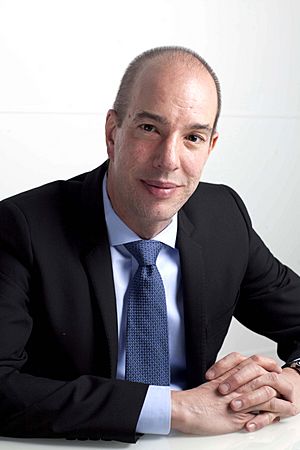Anthony D. Romero facts for kids
Quick facts for kids
Anthony Romero
|
|
|---|---|
 |
|
| 6th Executive Director of the American Civil Liberties Union | |
| Assumed office 2001 |
|
| Preceded by | Ira Glasser |
| Personal details | |
| Born | July 9, 1965 New York City, U.S. |
| Education | Princeton University (BA) Stanford University (JD) |
Anthony D. Romero was born on July 9, 1965. He is an American lawyer. He leads the American Civil Liberties Union (ACLU). He became the executive director in 2001. He was the first Latino person and the first openly gay man to hold this important job.
Contents
Early Life and Education
Anthony Romero grew up in the Bronx, New York City. His parents were from Puerto Rico. His father, Demetrio, worked hard at a hotel. He wanted a better job but was told his English wasn't good enough.
His father got help from his labor union's lawyer. They won the case, which helped his family. This allowed them to move to New Jersey and have a better life.
Anthony was the first person in his family to finish high school. He went to Princeton University and earned a degree in 1987. Later, he studied law at Stanford Law School. He became a lawyer in New York. He received special scholarships at both universities.
Early Career
Romero started his career at the Rockefeller Foundation. This organization helps support good causes. He helped decide how they would support civil rights.
In 1992, he joined the Ford Foundation. This foundation also gives money to help people. He worked on programs for civil rights and social justice. He quickly became a director, one of the youngest ever.
He managed about $90 million in grants. These grants helped projects for civil rights and human rights. He also started programs for fairness in voting and for the rights of immigrants, women, and LGBT people.
Leading the ACLU
Anthony Romero became the executive director of the American Civil Liberties Union (ACLU) in September 2001. The ACLU is a group that works to protect the rights and freedoms of all Americans. He took on this role just before the September 11, 2001, attacks.
After the 9/11 attacks, Romero started a campaign. It was called "Keep America Safe and Free." Its goal was to protect people's basic freedoms during a difficult time. The ACLU challenged parts of the Patriot Act in court. They won many cases. They also found many documents about how people were treated in U.S. custody.
Under Romero, the ACLU also challenged the government's NSA spying program. They were the first group to do so. He also helped lawyers defend people accused of crimes in special military courts. He believed that everyone deserves fair treatment.
Romero said that the years under President Bush were a "dark moment" for human rights in America.
After 9/11, more people joined the ACLU. Their membership grew from 300,000 to over 570,000. Donations also doubled. Romero used this growth to hire more staff. He also increased salaries to be fair. He made sure each ACLU office had a lawyer.
This growth helped the ACLU do more work. They expanded their efforts in racial justice and religious freedom. They also worked on privacy rights and reproductive freedom. New programs were created for human rights and privacy issues. This included concerns about new surveillance technology.
In 2007, Romero and the ACLU spoke out against the Pentagon. The Pentagon was watching antiwar protests. The ACLU believed this was wrong.
In 2013, Romero praised Edward Snowden. Snowden shared information about the NSA's activities. Romero said this action helped protect privacy.
In 2016, Romero signed a letter to the UN Secretary General. The letter asked for a kinder approach to drug policy.
Works Authored by Romero
- In Defense of Our America: The Fight for Civil Liberties in the Age of Terror. William Morrow, 2007. ISBN: 0-06-114256-5.
Recognition
In 2005, Time magazine named him one of the 25 Most Influential Hispanics.
In 2009, he received the Golden Plate Award. Archbishop Desmond Tutu presented it to him in South Africa.
He was also featured in an HBO documentary called The Latino List.
In 2020, he received the Woodrow Wilson Award from Princeton University.

